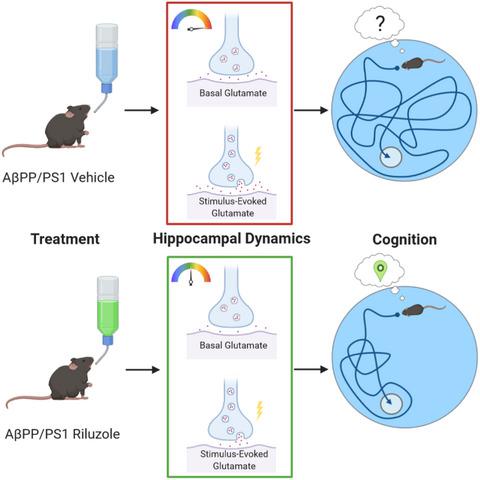当前位置:
X-MOL 学术
›
J. Neurochem.
›
论文详情
Our official English website, www.x-mol.net, welcomes your feedback! (Note: you will need to create a separate account there.)
Riluzole attenuates glutamatergic tone and cognitive decline in AβPP/PS1 mice
Journal of Neurochemistry ( IF 4.7 ) Pub Date : 2020-10-26 , DOI: 10.1111/jnc.15224 Kevin N Hascup 1, 2, 3 , Caleigh A Findley 1, 2 , Jesse Britz 2 , Nahayo Esperant-Hilaire 1 , Sarah O Broderick 1 , Kristin Delfino 4 , Shelley Tischkau 2, 3 , Andrzej Bartke 3, 5 , Erin R Hascup 1, 2
Journal of Neurochemistry ( IF 4.7 ) Pub Date : 2020-10-26 , DOI: 10.1111/jnc.15224 Kevin N Hascup 1, 2, 3 , Caleigh A Findley 1, 2 , Jesse Britz 2 , Nahayo Esperant-Hilaire 1 , Sarah O Broderick 1 , Kristin Delfino 4 , Shelley Tischkau 2, 3 , Andrzej Bartke 3, 5 , Erin R Hascup 1, 2
Affiliation

|
We have previously demonstrated hippocampal hyperglutamatergic signaling occurs prior to plaque accumulation in AβPP/PS1 mice. Here, we evaluate 2‐Amino‐6‐(trifluoromethoxy) benzothiazole (riluzole) as an early intervention strategy for Alzheimer's disease (AD), aimed at restoring glutamate neurotransmission prior to substantial Beta amyloid (Aβ) plaque accumulation and cognitive decline. Male AβPP/PS1 mice, a model of progressive cerebral amyloidosis, were treated with riluzole from 2–6 months of age. Morris water maze, in vivo electrochemistry, and immunofluorescence were performed to assess cognition, glutamatergic neurotransmission, and pathology, respectively, at 12 months. Four months of prodromal riluzole treatment in AβPP/PS1 mice resulted in long‐lasting procognitive effects and attenuated glutamatergic tone that was observed six months after discontinuing riluzole treatment. Riluzole‐treated AβPP/PS1 mice had significant improvement in long‐term memory compared to vehicle‐treated AβPP/PS1 mice that was similar to normal aging C57BL/6J control mice. Furthermore, basal glutamate concentration and evoked‐glutamate release levels, which were elevated in vehicle‐treated AβPP/PS1 mice, were restored to levels observed in age‐matched C57BL/6J mice in AβPP/PS1 mice receiving prodromal riluzole treatment. Aβ plaque accumulation was not altered with riluzole treatment. This study supports that interventions targeting the glutamatergic system during the early stages of AD progression have long‐term effects on disease outcome, and importantly may prevent cognitive decline. Our observations provide preclinical support for targeting glutamate neurotransmission in patients at risk for developing AD.
中文翻译:

利鲁唑减弱 AβPP/PS1 小鼠的谷氨酸能张力和认知能力下降
我们之前已经证明海马高谷氨酸能信号传导发生在 AβPP/PS1 小鼠斑块积累之前。在这里,我们评估了 2-氨基-6-(三氟甲氧基)苯并噻唑(利鲁唑)作为阿尔茨海默病 (AD) 的早期干预策略,旨在在大量 β 淀粉样蛋白 (Aβ) 斑块积聚和认知能力下降之前恢复谷氨酸神经传递。雄性 AβPP/PS1 小鼠(一种进行性脑淀粉样变性模型)在 2-6 个月大时接受利鲁唑治疗。Morris 水迷宫、体内电化学和免疫荧光分别在 12 个月时评估认知、谷氨酸能神经传递和病理学。在 AβPP/PS1 小鼠中进行 4 个月的前驱利鲁唑治疗产生了持久的预认知作用并减弱了在停止利鲁唑治疗 6 个月后观察到的谷氨酸能张力。与载体处理的 AβPP/PS1 小鼠相比,利鲁唑处理的 AβPP/PS1 小鼠的长期记忆有显着改善,与正常老化的 C57BL/6J 对照小鼠相似。此外,在接受前驱利鲁唑治疗的 AβPP/PS1 小鼠中,载体处理的 AβPP/PS1 小鼠中升高的基础谷氨酸浓度和诱发谷氨酸释放水平恢复到在年龄匹配的 C57BL/6J 小鼠中观察到的水平。利鲁唑治疗未改变 Aβ 斑块积聚。这项研究支持在 AD 进展早期针对谷氨酸能系统的干预措施对疾病结果具有长期影响,并且重要的是可以防止认知能力下降。我们的观察结果为有患 AD 风险的患者靶向谷氨酸神经传递提供了临床前支持。
更新日期:2020-10-26
中文翻译:

利鲁唑减弱 AβPP/PS1 小鼠的谷氨酸能张力和认知能力下降
我们之前已经证明海马高谷氨酸能信号传导发生在 AβPP/PS1 小鼠斑块积累之前。在这里,我们评估了 2-氨基-6-(三氟甲氧基)苯并噻唑(利鲁唑)作为阿尔茨海默病 (AD) 的早期干预策略,旨在在大量 β 淀粉样蛋白 (Aβ) 斑块积聚和认知能力下降之前恢复谷氨酸神经传递。雄性 AβPP/PS1 小鼠(一种进行性脑淀粉样变性模型)在 2-6 个月大时接受利鲁唑治疗。Morris 水迷宫、体内电化学和免疫荧光分别在 12 个月时评估认知、谷氨酸能神经传递和病理学。在 AβPP/PS1 小鼠中进行 4 个月的前驱利鲁唑治疗产生了持久的预认知作用并减弱了在停止利鲁唑治疗 6 个月后观察到的谷氨酸能张力。与载体处理的 AβPP/PS1 小鼠相比,利鲁唑处理的 AβPP/PS1 小鼠的长期记忆有显着改善,与正常老化的 C57BL/6J 对照小鼠相似。此外,在接受前驱利鲁唑治疗的 AβPP/PS1 小鼠中,载体处理的 AβPP/PS1 小鼠中升高的基础谷氨酸浓度和诱发谷氨酸释放水平恢复到在年龄匹配的 C57BL/6J 小鼠中观察到的水平。利鲁唑治疗未改变 Aβ 斑块积聚。这项研究支持在 AD 进展早期针对谷氨酸能系统的干预措施对疾病结果具有长期影响,并且重要的是可以防止认知能力下降。我们的观察结果为有患 AD 风险的患者靶向谷氨酸神经传递提供了临床前支持。


























 京公网安备 11010802027423号
京公网安备 11010802027423号